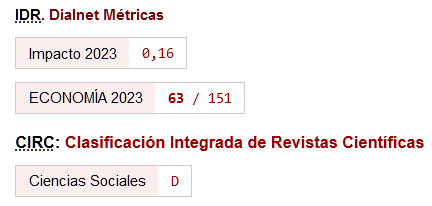Emisiones de gases de efecto invernadero y estructuras de consumo en España.
Keywords:
input-output, cansumption pattern, greenhouse gases emissionsAbstract
In order to evaluate the responsibility for the greenhouse gas emissions from two different frameworks, it should be applied both a production and a consumption accounting principle. By using the consumption principle, we analyse the relation between Spanish household consumption patterns and greenhouse gas emissions in 1998. We combine input-output tables, national consumer survey statistics and environmental pollution satellite accounts into a generalized environment input-output model. It is concluded that the more income households have, the more emissions of greenhouse gases they generate. However, the results also show that their consumption patterns contribute less to the global warming.
Downloads
References
BIESIOT, W. Y K. J. NOORMAN(1999): "Energy requirements of household consumption: a case study of The Netherlands", Ecological Economics, vol. 28, nº. 3, pp. 367-383. https://doi.org/10.1016/S0921-8009(98)00113-X
DE JUAN, O. Y E. FEBRERO(2000): "Measuring Productivity from Vertically Integrated Sectors", Economic Systems Research, vol. 12, nº. 1, pp. 65-88. https://doi.org/10.1080/095353100111281
DUCHIN, F. (1998): Structural Economics. Measuring Change in Technology, Lifestyles, and the Environment, Island Press, Washington D.C.
INE (1999): Encuesta Continua de Presupuestos Familiares. Base 97, Instituto Nacional de Estadística, Madrid.
INE (2003): "Tablas de origen y destino 1998", Cuentas económicas: Contabilidad nacional de España (base 1995). Marco input-output, disponibles en www.ine.es.
INE (2004): Estadísticas de Medio Ambiente. Cuentas Ambientales 2002, Instituto Nacional de Estadística, Madrid.
IPCC (1997): Revised 1996 IPCC Guidelines for National Greenhouse Gas Inventories, Intergovernmental Panel on Climate Change, Reino Unido.
JACOBSEN, H. K. (2000): "Energy demand, structural change and trade: a decomposition analysis of the Danish manufacturing industry", Economic Systems Research, vol. 12, nº. 3, pp. 319-343.
https://doi.org/10.1080/09535310050120916
LEZEN, M. (1998): "The energy and greenhouse gas cost of living for Australia during 1993-94", Energy, vol. 23, nº. 6, pp. 497-513. https://doi.org/10.1016/S0360-5442(98)00020-6
LEZEN, M. (2001): "A generalised input-output multiplier calculus for Australia", Economic Systems Research, vol. 13, nº. 1, pp. 65-92. https://doi.org/10.1080/09535310120026256
MANCERO, X. (2001): Escalas de equivalencia: reseña de conceptos y métodos, Serie Estudios Estadísticos y Prospectivos, CEPAL, Publicaciones de las Naciones Unidas, Santiago de Chile.
MILLER, R. E. Y P. D. BLAIR (1985): "Energy Input-Output Analysis" y "Environmental Input-Output Analysis", Input-Output Analysis: Foundations and Extensions, Prentice-Hall, Englewood Cliffs, cap. 6 y 7, pp. 200-265.
MINISTERIO DE MEDIO AMBIENTE (2003): Inventario de emisiones de gases de efecto invernadero de España. Años 1990-2002. Comunicación a la Comisión Europea, (Decisión 1999/296/CE), Subdirección General de Calidad Ambiental, Dirección General de Calidad y Evaluación Ambiental, Ministerio de Medio Ambiente, Madrid.
MORENO, M. C. (2004): Discriminación fiscal de la familia a través del IRPF. Incidencias de la diversidad territorial en la desigualdad del tratamiento, Documentos Instituto de Estudios Fiscales, Documento nº. 18/04.
MUKHOPADHYAY, K. Y D. CHAKRABORTY (1999): "India's energy consumption changes during 1973/74 to 1991/92", Economic Systems Research, vol. 11, nº. 4, pp. 423-438. https://doi.org/10.1080/09535319900000030
MUNKSGAARD, J. Y K. A. PEDERSEN(2001): "CO2 accounts for open economies: producer or consumer responsibility?", Energy Policy, nº. 29, pp. 327-334. https://doi.org/10.1016/S0301-4215(00)00120-8
MUNKSGAARD, J.; K. A. PEDERSEN Y M. WIER (2000): "Impact of household consumption on CO2 emissions", Energy Economics, nº. 22, pp. 423-440. https://doi.org/10.1016/S0140-9883(99)00033-X
PASINETTI, L. (1981): Structural Change and Economic Growth: a theoretical essay on the dynamics of the wealth of nations, Cambridge University Press, Cambridge, (tr. castellana de Manuel Ahijado, Cambio estructural y crecimiento económico, Ediciones Pirámide, Madrid, 1985).
PROOPS, J. L. R.; M. FABER Y G. WAGENHALS (1993): Reducing CO2 Emissions: A Comparative Input-Output Study for Germany and the UK, Springer, Berlin. https://doi.org/10.1007/978-3-642-77792-9
KURZ, H. D.; E. DIETZENBACHER Y C. LAGER (eds.) (1998): "Energy and Environment", Input-Output Analysis, Edward Elgar, Cheltenham, vol. II, pp. 3-128. https://doi.org/10.4337/9781843768678.00083
SCHNEIDER, M. H. Y S. A. ZENIOS (1990): "A comparative study of algorithms for matrix balancing", Operations Research, vol. 38, nº. 3, pp. 339-455. https://doi.org/10.1287/opre.38.3.439
UNITED NATIONS (1997): Kyoto Protocol to the United Nations Framework Convention on Climate Change, 10 December 1997 (FCCC/CP/L.7/Add.1) https://doi.org/10.1093/jel/10.1.215
VRINGER, K. Y K. BLOK (1995): "The direct and indirect energy requirements of households in the Netherlands", Energy Policy, vol. 23, nº. 10, pp. 893-910. https://doi.org/10.1016/0301-4215(95)00072-Q
WEBER, C. Y A. PERRELS (2000): "Modelling lifestyle effects on energy demand and related emissions", Energy Policy, nº. 28, pp. 549-566. https://doi.org/10.1016/S0301-4215(00)00040-9
WIER, M. (1998): "Sources of changes in emissions from energy: a structural decomposition analysis", Economic Systems Research, vol. 10, nº. 2, pp. 99-113. https://doi.org/10.1080/09535319808565469
WIER, M.; M. LEZEN; J. MUNKSGAARD Y S. SMED (2001): "Effects of Household Consumption Patterns on CO2 Requirements", Economic Systems Research, vol. 13, nº. 3, pp. 259-274.
https://doi.org/10.1080/09537320120070149
WILTING, H. C.; W. BIESITO Y H. C. MOLL (1999): "Analyzing potentials for reducing the energy requirement of households in The Netherlands", Economic Systems Research, vol. 11, nº. 3, pp. 233-243. https://doi.org/10.1080/09535319900000016
Downloads
Published
How to Cite
Issue
Section
License
This licence allows third parties to share (copy and redistribute the material in any medium or format) and adapt (remix, transform and create from the material for any purpose, including commercial purposes), provided that authorship and first publication in this journal (The Journal, DOI of the work) is acknowledged, a link to the licence is provided, and it is stated whether changes have been made to the work.







